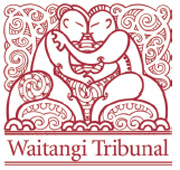The economy of the Cook Islands is based mainly on tourism, with minor exports made up of tropical and citrus fruit. Manufacturing activities are limited to fruit-processing, clothing and handicrafts.

The Waitangi Tribunal is a New Zealand permanent commission of inquiry established under the Treaty of Waitangi Act 1975. It is charged with investigating and making recommendations on claims brought by Māori relating to actions or omissions of the Crown, in the period largely since 1840, that breach the promises made in the Treaty of Waitangi. The Tribunal is not a court of law; therefore, the Tribunal's recommendations and findings are not binding on the Crown. They are sometimes not acted on, for instance in the foreshore and seabed dispute.

Winston Raymond Peters is a New Zealand politician who has been the leader of New Zealand First since it was founded in 1993. He was re-elected for a fifteenth time at the 2023 general election, having previously been a member of Parliament (MP) from 1979 to 1981, 1984 to 2008 and 2011 to 2020. Peters has served as the 13th deputy prime minister of New Zealand and 25th minister of foreign affairs since November 2023.
New Zealand First, commonly abbreviated to NZ First or NZF, is a political party in New Zealand, led by and identified with veteran politician Winston Peters. The party has formed coalition governments with both major political parties in New Zealand: with the New Zealand National Party from 1996 to 1998 and 2023 to present, and with the New Zealand Labour Party from 2005 to 2008 and 2017 to 2020. New Zealand First currently serves in a coalition government with both National and ACT as part of the Sixth National government.

The Serious Fraud Office (SFO) is a non-ministerial government department of the Government of the United Kingdom that investigates and prosecutes serious or complex fraud and corruption in England, Wales and Northern Ireland. The SFO is accountable to the Attorney General for England and Wales, and was established by the Criminal Justice Act 1987, an Act of the Parliament of the United Kingdom.
David MacKellar Richwhite is a New Zealand investment banker and was a partner in Fay, Richwhite & Company with Sir Michael Fay.
The South African Revenue Service (SARS) is the revenue service of the South African government. It administers the country's tax system and customs service, and enforces compliance with related legislation. It is governed by the SARS Act 34 of 1997, which established it as "an organ of state within the public administration, but as an institution outside the public service." It thus has a significant degree of administrative autonomy, although it is under the policy control of the Minister of Finance. Effectively, SARS manages, administers, and implements the tax regime as designed by the Minister and National Treasury.
Inland Revenue or Inland Revenue Department is the public service department of New Zealand charged with advising the government on tax policy, collecting and disbursing payments for social support programmes, and collecting tax.
Ian Wishart is a New Zealand journalist, author and publisher, and the editor of Investigate magazine. He is a conservative Christian, an opponent of the scientific consensus on climate change, and has been described as a "professional controversialist".
The Henry family migrated to New Zealand from Scotland in the 1870s. In New Zealand they played a major role in forestry, industry, law and philanthropy.
Sir Ivor Lloyd Morgan Richardson was an eminent New Zealand and Commonwealth jurist and legal writer and a member of the Judicial Committee of the Privy Council.
Brian Phillip Henry is a New Zealand barrister and a descendant of the industrialist Henry family.

Allan James Hubbard was a businessman who lived in Timaru in the South Island of New Zealand, and was the founder of South Canterbury Finance, New Zealand's largest locally owned finance company. In 2006, the New Zealand Listener described Hubbard as the most powerful businessman in the South Island.

The 2017 New Zealand general election took place on Saturday 23 September 2017 to determine the membership of the 52nd New Zealand Parliament. The previous parliament was elected on 20 September 2014 and was officially dissolved on 22 August 2017. Voters elected 120 members to the House of Representatives under New Zealand's mixed-member proportional (MMP) voting system, a proportional representation system in which 71 members were elected from single-member electorates and 49 members were elected from closed party lists. Around 3.57 million people were registered to vote in the election, with 2.63 million (79.8%) turning out. Advance voting proved popular, with 1.24 million votes cast before election day, more than the previous two elections combined.
The right to be free from unreasonable search and seizure is well-recognised by the international human rights community. Section 21 of the New Zealand Bill of Rights Act 1990 incorporates this right into New Zealand law, stating that: "Everyone has the right to be secure against unreasonable search or seizure, whether of the person, property, or correspondence or otherwise."

Commissioner of Inland Revenue v Challenge Corp Ltd [1986] NZPC 1; [1986] UKPC 45; [1987] AC 155; [1986] 2 NZLR 513; [1987] 2 WLR 24; (1986) 10 TRNZ 161 is a prominent case in New Zealand tax law regarding the issue of tax avoidance.

The 2020 New Zealand general election was held on Saturday 17 October 2020 to determine the composition of the 53rd New Zealand Parliament. Voters elected 120 members to the House of Representatives, 72 from single-member electorates and 48 from closed party lists. Two referendums, one on the personal use of cannabis and one on euthanasia, were also held on the same day. Official results of the election and referendums were released on 6 November.
A Presidential Commission of Inquiry is a major ad-hoc formal public inquiry into a defined issue ordered by the President of Sri Lanka to report findings, give advice and make recommendations.

The 2023 New Zealand general election was held on 14 October 2023 to determine the composition of the 54th Parliament of New Zealand. Voters elected 122 members to the unicameral New Zealand House of Representatives under the mixed-member proportional (MMP) voting system, with 71 members elected from single-member electorates and the remaining members elected from closed party lists. Of the 72 electorates, only 71 seats were filled, with the remaining electorate MP determined in the 2023 Port Waikato by-election, due to the death of one of the general election candidates. Two overhang seats were added due to Te Pāti Māori winning six electorate seats when the party vote only entitled them to four seats, with an additional overhang seat added after the by-election making for 123 members of parliament.








